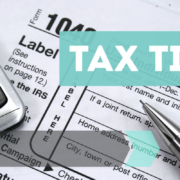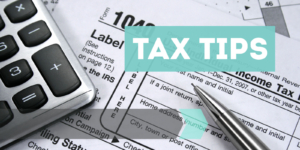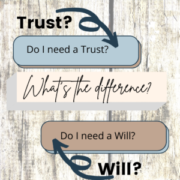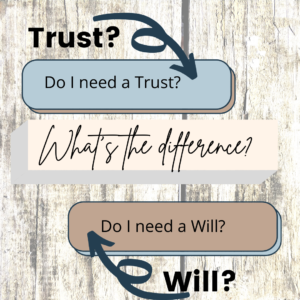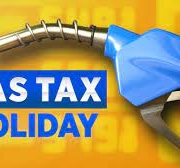It’s fair to say there’s a lot going on in the world. In some ways, we haven’t had any breaks from worrying about something. And just when we thought that was letting up, here comes a little something called inflation knocking at the door.
Really, if you wanted to sum up the U.S. economy in one word lately, it’d be pretty easy: inflation. What used to be a chapter you dreaded in your high school economics class is now the hottest topic at the water cooler. So, what is inflation? Well, if you snoozed through that economics class, don’t worry—we’ll get you caught up on what inflation is, why people are talking about it more now, and what you can do to guard your money from inflation.
What Is Inflation?
We’ve all heard a ton about it lately, but what is inflation really?
Inflation is basically when the prices of goods and services go up. It’s measured by how much prices inch up over time and tracks how the value of money falls because of those price hikes. Yeah, it’s not the best dinner party topic. But the truth is, inflation is nothing new. It’s not some big, scary money term that didn’t exist until 2020. Inflation has been around forever.
What Is the Inflation Rate Right Now?
As of March 2022, the inflation rate in the U.S. had risen to 8.5% over the previous 12 months—up 1.2% from February’s numbers.1 That’s the biggest 12-month inflation surge in 40 years (December 1981)! Given all that, it’s no wonder everyone is shouting about inflation these days—because we’re seeing the sticker prices and feeling it in our budgets.
Our Ramsey State of Personal Finance report from early 2021 found that 3 in 4 Americans said they’ve seen higher prices on things they normally buy. On top of that, the State of Personal Finance 2022 annual report showed that 71% of Americans say inflation has impacted their lives—with 26% saying it has had significant impact. So, if you still think inflation isn’t happening right now—think again. Whether we want to admit it or not, inflation is here, and it’s sticking around, folks.
What Is Transitory Inflation?
Transitory inflation happens when prices go up, but the rising prices are short-lived and don’t leave a permanent mark (aka high inflation that goes on for a long time). It’s an economic term used to talk about inflation when it’s quick and painless. Basically, prices might be inflated, but it won’t last long. It’s temporary. It’ll peak and then come back down again.
Does any of that sound like what we’ve seen in the last year?
Nope, we didn’t think so either.
For months, the powers that be (aka the Fed) have been telling us not to worry about inflation—it’s just transitory. But these price spikes have been anything but. Instead of inflation calming down or even leveling off, it’s been gaining rapid speed with each month that goes by. And most people are fed up with being talked down to about it. But don’t worry, there are lots things you can do to protect yourself against inflation (we’ll cover that a little later).
Types of Price Indexes
Here in the U.S., we measure inflation by three things—the Consumer Price Index (CPI), Producer Price Index (PPI), and Personal Consumption Expenditures Price Index (PCE). It’s a mouthful, but it goes a long way to track the changes in prices of goods and production.
Here’s how it all breaks down:
Consumer Price Index (CPI)
The Consumer Price Index measures the change in the prices of goods and services that consumers pay over time. In other words, CPI is tracking how much your toothpaste costs today compared to three years ago.
Producer Price Index (PPI)
The Producer Price Index is kind of similar to the Consumer Price Index, but PPI measures the change in selling prices over time for those creating the product. Think how much the maker of your favorite shoes is paying to make your shoes.
Personal Consumption Expenditures Price Index (PCE)
And the last one here, the PCE Price Index, shows the actual month-to-month changes in the prices of services that consumers actually bought. Think of this one as the way to figure out if people are really laying down their hard-earned cash and buying the stuff or not.
It all sounds like one big headache (probably because it is), but looking at all that data together gives you a pretty good idea of what’s happening in the world of inflation and with our money’s purchasing power.
What Is Purchasing Power?
Purchasing power all comes down to the value of currency. In the U.S. when people say purchasing power, they’re usually talking about how far your dollar bills go to cover the price of items you want to buy. Like, when you go to the store, could your $1 buy one or two packs of gum? And it’s no secret that a dollar bill with George Washington’s face on it has way less purchasing power than it did 50, 20 or even just 10 years ago. In fact, according to the Ramsey State of Personal Finance 2022 annual report, 85% of Americans say their money doesn’t go as far as it used to. Thanks, inflation!
What Causes Inflation?
Inflation happens when prices go up and the purchasing power (the value of the currency) goes down as time goes on. But what’s the deal here? Why can’t a dollar today buy you as much as it did in 1955? Step into our economics class and we’ll try to walk you through it (without putting you to sleep).
Inflation happens when the price of goods goes up. But what causes the price of things to go up anyway? It all goes back to supply and demand. When people want to buy things but there aren’t enough things for them to buy, the price goes up to meet the demand.
Basically, inflation makes the value of that $20 bill in your pocket drop over time. Remember how your grandparents talked about how they could buy nickel candy and go see a movie for under $1? Must’ve been nice for them! Inflation is the reason we don’t pay the same prices for those things today.
Now, there are two different types of inflation, and each one can impact how prices go up. Let’s walk through them:
Demand-Pull Inflation
This happens when the demand for goods goes up but the supply stays the same. If sellers can’t keep up with the supply, then they can raise their prices. This makes the prices pull up to keep up with the demand.
Cost-Push Inflation
This takes place when the supply of goods is low but the demand for them stays the same. When this happens, the prices are pushed up (usually by some kind of event cutting off the supply). We saw this happen when the global supply chain took a hit at the beginning of COVID-19 and when the Suez Canal was blocked and when the Colonial Pipeline was hacked. Now, some of that (okay, a lot of that) was caused by people panic buying, but it was still because of an event that caused prices to push up.
What Is Happening With Inflation Right Now?
Because of the pandemic, the Federal Reserve started “printing” virtual money last year.2 Their goal? To pad the economic and banking markets from taking too big of a hit from the COVID-19 fallout. And now that things have opened up again, that money is starting to move around and stimulate the economy.
Oh, and speaking of stimulated . . . remember all those stimulus checks? Well, somebody has to pay for them. The government’s spending went through the roof in the last year, and yep—you guessed it—that impacts inflation. Yeah, you could say things have been, uh, stimulated for sure.
But inflation’s not just the government’s fault (as much as we might want to pin it all on them). Throw in the housing inventory shortage, the lumber shortage, and the car shortage (seriously, what hasn’t had a shortage in the last year?). That’s a whole lot of demand and not enough supply—which is exactly what causes inflation.
Don’t believe it? It’s hard to argue with the facts: Home listing prices have gone up by 10.3% since last year, the price of lumber has shot up 130% since April 2020 (but is starting to calm down), and the average list price of used cars jumped to an all-time high of more than $29,000 (that’s the first time it’s ever been over $29K).
How Do Interest Rates Affect Inflation?
Ah, yes, we’ve all heard about those crazy low mortgage interest rates—but how does something like that affect other things long term? It might sound kind of strange, but the Federal Reserve lowering these interest rates actually plays a part in inflation.
When interest rates are low, the economy usually grows, but that can also cause prices to go up. That means people are usually okay with borrowing money (boo!), and they feel more comfortable with spending too. Because of that, more money flows through the economy when interest rates hang out at a lower rate.
The opposite happens when interest rates rise. When interest rates are higher, people buy less, the economy slows down, and inflation drops. Think about it: When interest rates on homes are higher—there aren’t as many people lined up to buy them, right? And with higher interest rates, people tend to save and invest more because their rates of return go up too. With fewer people spending their money, the economy slows down and inflation chills out.
So, whose job is it to handle this delicate little balancing act? The Fed. They have to have a close watch on the Consumer Price Index and Producer Price Indexes to try to keep the economy steady around the ideal inflation rate of 2%.
How Inflation Affects You and the Economy
If you’re still wondering, What is inflation? (like a lot of us are these days), just remember that most inflation goes back to the basic supply and demand problem. If items that people need or want are hard to find, it drives the cost up and creates a scarcity mindset (where you think there won’t be enough of something left for you to have any). If you can flood the market with enough product, then the demand goes down and prices can go down.
Oversupply = prices going down. Undersupply = prices going up.
When inflation happens, you see the effects of it hit stores—and your wallet—pretty fast. We’re seeing this kind of thing play out now with meat and seafood prices rising 79%, dairy prices rising 76%, and fresh produce rising 71%. And prices going up is the part where that nasty word inflation actually starts to impact you. All of a sudden, regular products you used to be able to buy for a decent amount jump in price. I don’t remember cheese costing that much! Yeah, you’re not making it all up in your head.
Oh, and let’s not forgot about that sneaky thing called shrinkflation—when companies give you less of a product but charge you the same amount (so they can give their profit margins a buffer against things like inflation). Again, you’re not imagining things here. That potato chip bag probably does have less in it than it used to.
How to Protect Yourself Against Inflation
If you’re sitting there thinking, Well, great, this sounds all doom and gloom, think again. What can you do to shield yourself from inflation? Plenty.
1. Stay calm.
When people start talking about inflation, it seems like everyone wants to fill up every container they own with gasoline, start collecting gold, panic buy yeast for baking, and stick their cash under their mattress. Woah there, pal. Slow down, breathe, and take it easy. We can’t stress this enough: You can prepare without panicking. And the first step here is just keeping your cool.
2. Budget.
Inflation or not, you’re still in control of your money. Armed with a budget, you’ll be able to make sure your money is going toward the right things while being able to find places where you can cut back your spending.
On the not-so-fun side of things, if you’re noticing the prices of things like food and gas rising in your area, then you’re going to need to adjust your budget too. (Did that gallon of milk go from $3.50 to $3.99? Yep, been there.) That way, you’ll know exactly how much you’re working with and won’t be in for any surprises.
Let the budget be your guide as you look for places to cut back so you can beef up your grocery cash to cover that dadgum expensive milk. Maybe you’re not traveling right now or not having to pay for your kid’s ballet class for the next few months. Whatever it is—be on the lookout for it.
Here are some ideas from people we surveyed in our Ramsey State of Personal Finance report: 38% of folks have looked for coupons or sales to save more, 32% have bought less than they normally would, 29% have put off purchasing an item, and 25% have switched to the store brand. So, you’re definitely not alone in trying to make your dollars cover more ground these days.
3. Save.
If you’re feeling that pinch and want to save even more, look for ways to lower your grocery bill or save money on gas. Maybe it’s finally time you switch over to generic brands or carpool into work. And if you find great deals on canned food and things you can stock your pantry with (that you’ll actually use), then go ahead and stock up on food. Just make sure you’ve budgeted for that before you head into the grocery store. That way, you already know exactly what you’ll spend and won’t get swept up into the panic buying (toilet paper circa 2020, anyone?).
4. Invest.
Like it or not, inflation is a thing. If you retire in 20 or 30 years, it’s pretty much a guarantee that the cost of a loaf of bread, tank of gas and cup of coffee will have gone up by then. The best way to protect yourself against inflation (that’s bound to happen), is to invest your money—the sooner the better. But remember, if you still have debt (other than your mortgage) and don’t have an emergency fund sitting pretty, you need to take care of both of those things first. The sooner you take care of all of that, the sooner you can invest and get to work on your long-term goals.
So, what is inflation? Well, it’s definitely something you can combat—you just need the right tools. Ready to go to battle against inflation? Start by having a solid investment plan. And no—that doesn’t mean stuffing cash under your mattress. Make sure you connect with a financial advisor to talk through all your investing options. They’ll give you the right kind of advice and insight you need to protect yourself against inflation in the future. Make sure you get the most bang for your buck when it comes to investing.




